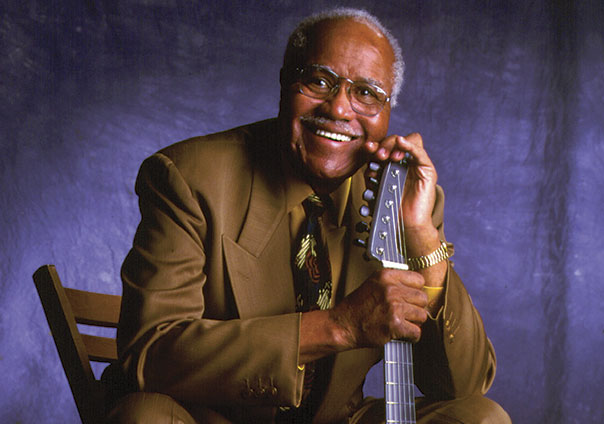Roebuck “Pops” Staples left it until late in his seventh decade before embarking on a solo career. Until that point he had been the mentor of his family gospel group, the Staple Singers, guiding them through 30 years of progress to international fame. Only when Mavis, his younger daughter and the group’s lead singer, decided to strike out on her own did he take the chance to step into the spotlight himself.
Not that he made much of a fuss about it. Anyone who met Pops Staples before his death in 2000, at the age of 85, recognised that here was a man of quiet modesty, who lived by the words he sang. His gentle vocal delivery and his distinctive reverb-soaked guitar tone were of a piece with that wise humility.
Musicians loved him. Ask Curtis Mayfield, who built his early hits songs on an adaptation of that guitar sound. Or Ry Cooder, who co-produced the two solo albums released during Pops’ lifetime: Peace To The Neighborhood (1992) and Father, Father (1994). They knew that this was a man who, born in 1914, grew up picking cotton on Will Dockery’s plantation in Sunflower County, Mississippi, where he heard Charley Patton play in front of the general store. At 12 years of age Roebuck got his first guitar, and learnt to play the blues – although later on he averred that his heart was never in it.
He made the classic migration north to Chicago in 1935, a handful of dollars in his pocket. Within a year his earnings from a job in the stockyards enabled him to call his wife and the first of their children to join him. He abandoned the guitar for 10 years, but hearing Big Bill Broonzy and others inspired him to buy a new instrument and rediscover his skills. Soon he was performing gospel songs in storefront churches, and teaching his growing family to sing along in simple harmony. Their recording career began in 1952 and the run of hits lasted until “Respect Yourself” and “I’ll Take You There” brought them a global audience 20 years later.
The first of his solo albums was nominated for a Grammy and the second actually won one. When he died he left a number of unfinished tracks in Mavis’s keeping; they now see the light of day as Don’t Lose This, restored and refurbished by Wilco’s Jeff Tweedy, who produced Mavis’s well received albums You Are Not Alone and One True Vine in 2010 and 2013 respectively.
The Wilco frontman knows not to try anything fancy with this material. There’s a hint of Americana in the rustic-sounding drums, but no post-production tricks are allowed to get in the way of the signature Staples sound. Roebuck’s lead vocals, with that confiding intimacy that made him sound like the precursor of Bill Withers, take centre-stage on songs such as “Somebody is Watching Me” and “Friendship”, while Mavis steps forward from time to time, notably on “Love On My Side”.
The guitar is at full strength on “Nobody’s Fault But Mine”, unaccompanied but as big as any band (interestingly, Roebuck seemed to be able to get his signature sound on any combination of equipment, from the Gibson Les Paul and matching amp set-up of his ’50s VeeJay sides to the Stratocaster and Fender Twin of his later years). On the slinky groove of “The Lady’s Letter”, the family vocal blend first supports him and then takes over for a nostalgic chorus (“Hmm,” Roebuck murmurs appreciately as the track ends). On “Better Home”, Mavis wraps her voice around his with infinite tenderness in a gorgeous duet. There’s an appealing remake of “Will The Circle Be Unbroken”, one of the Staple Singers’ early hits, and the album closes with a driving live version of Dylan’s gospel-blues “Gotta Serve Somebody”, reminding us that Bob once unsuccessfully proposed marriage to Mavis.
However much work Tweedy needed to do to complete this record, the result is never lacking in sensitivity, authenticity or integrity. “What do you think?” Pops asks his daughter as the last notes of the lovely “Sweet Home” die away. “I think it’s good, Daddy,” Mavis replies. I’ll go with that, and raise the mark a notch for the very fact of the album’s existence.



